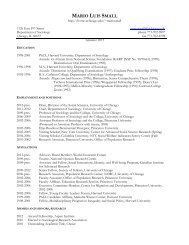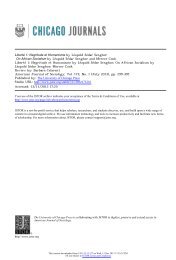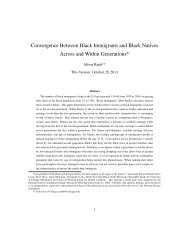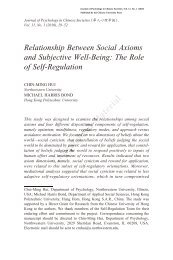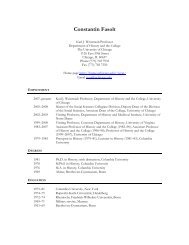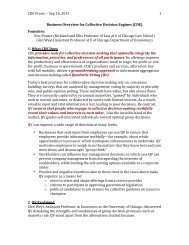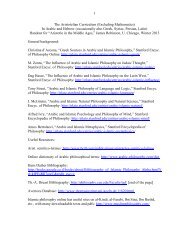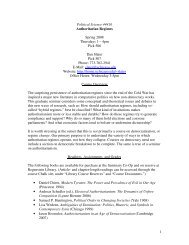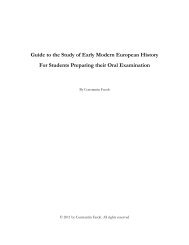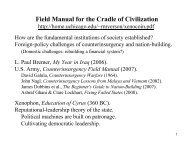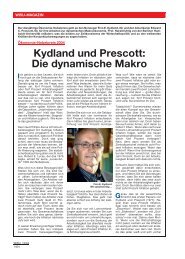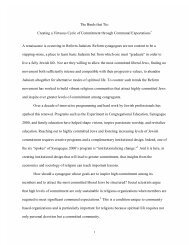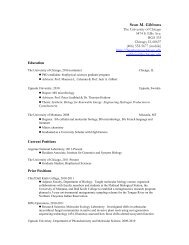Job Market Paper - Personal Web Pages - University of Chicago
Job Market Paper - Personal Web Pages - University of Chicago
Job Market Paper - Personal Web Pages - University of Chicago
You also want an ePaper? Increase the reach of your titles
YUMPU automatically turns print PDFs into web optimized ePapers that Google loves.
Kim: Endogenous Choice <strong>of</strong> a Mediator<br />
consider a mediator to be represented as a mechanism. The definitions <strong>of</strong> what follows are done in<br />
full generality, although I later come to a specific problem in the context <strong>of</strong> international conflict<br />
in Section 2.2, in which I will be interested in the case <strong>of</strong> two players, each with two types, and two<br />
outcomes.<br />
2.1 The Base Setup<br />
The two-person bargaining problem is characterized by the following structures:<br />
Γ = (D, d 0 , T 1 , T 2 , u 1 , u 2 , p 1 , p 2 ),<br />
whose components are interpreted as follows. D is the set <strong>of</strong> feasible bargaining outcomes available<br />
to the two players from which they can choose. d 0 ∈ D denotes the disagreement outcome, which<br />
the two players get if they fail to coordinate on choosing a mediator. For each i ∈ {1, 2}, T i is<br />
the set <strong>of</strong> possible types t i for player i. 6 The players are uncertain about each other’s type, and<br />
the players’ types are unverifiable. For each i ∈ {1, 2}, u i is player i’s utility pay<strong>of</strong>f function from<br />
D × T 1 × T 2 into R, such that u i (d, t) denotes the pay<strong>of</strong>f to player i if d ∈ D is the outcome and<br />
t ∈ T is the true vector <strong>of</strong> the players’ types. The pay<strong>of</strong>fs are in von Neumann-Morgenstern utility<br />
scale. Each p i is a conditional probability distribution function that represents player i’s beliefs<br />
about the other player’s type as a function <strong>of</strong> his own type. That is, p i (t −i |t i ), i ∈ {1, 2}, denotes<br />
the conditional probability that player i <strong>of</strong> type t i would believe about the other player’s type being<br />
t −i .<br />
Let T = T 1 × T 2 denote the set <strong>of</strong> all possible type combinations t = (t 1 , t 2 ). For mathematical<br />
simplicity, I assume D and T are finite sets. Without loss <strong>of</strong> generality, I assume the utility pay<strong>of</strong>f<br />
scales are normalized so that u i (d 0 , t) = 0 for all i and all t. That is, each player could guarantee<br />
himself a pay<strong>of</strong>f <strong>of</strong> zero by refusing to involve a mediator.<br />
For simplicity, I assume that the players’ beliefs are consistent with some prior probability<br />
distribution ¯p in ∆(T ), which is common knowledge, under which the players’ types are independent<br />
random variables. That is, I assume that for every i, there exists a probability distribution ¯p i in<br />
∆(T i ) such that ¯p i (t i ) is the prior marginal probability that player i’s type will be t i and<br />
p i (t −i |t i ) = ¯p −i (t −i ), ∀i ∈ N, ∀t −i ∈ T −i , ∀t i ∈ T i .<br />
6 Each t i ∈ T i represents player i’s characteristics, such as preferences, strengths, capabilities, or endowments.<br />
6



